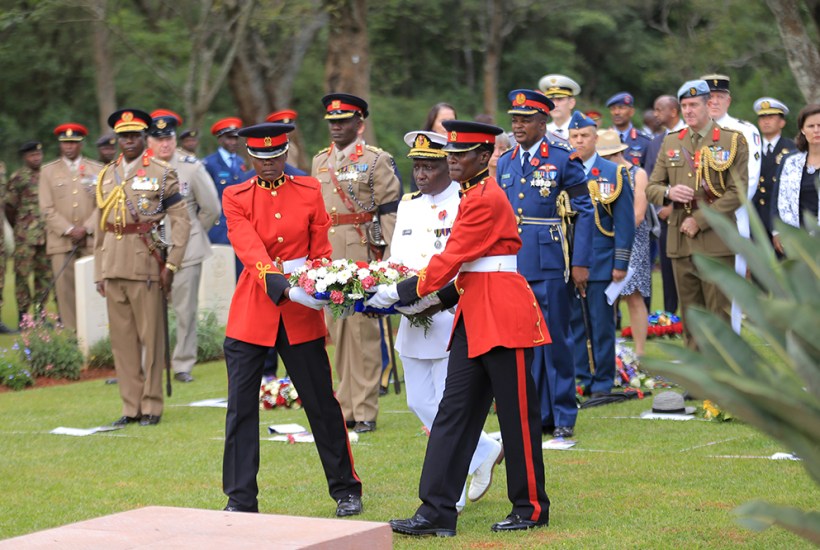On Remembrance Sunday in Nairobi nearly a decade ago, an ancient Kenyan veteran told Sam Mattock, a British ex-cavalry officer, that he had lost his second world war service medals. Could Sam help replace them? In a culmination of Sam’s personal efforts, King Charles III, on his visit to Kenya with Queen Camilla next week, will present medals to four veterans who fought for the empire in North Africa, Madagascar and Burma. The youngest of them, Kefa Chagira and Ezekiel Anyange, are 99. John Kavai is 101 and the eldest, Samweli Mburia, is 117 and served as a corporal in Burma.
One hundred thousand African troops fought the Japanese in Burma’s jungle, in a theatre that became known as the Forgotten War. In his superb memoir Warriors and Strangers, former King’s African Rifles officer Gerald Hanley told how he met an elderly Maasai many years later who produced a Japanese officer’s sword, which he had taken as a trophy in hand-to-hand combat. ‘We would follow Japanese tracks in the jungle and attack,’ remembers a very old Eusebiu Mbiuki Baikunyua today.
When the Kenyan soldiers returned from the fighting, some of them were fired up by their conversations with nationalists from India and other African countries, and they joined the Mau Mau guerrilla army that fought for independence from Britain in the 1950s. In that vicious insurgency, Sam learned that some war veterans feared they’d be seen as collaborators for having fought for the British, and so they threw their service medals away. Others simply lost them over time. Sam began tracking down surviving Kenyans who had served and checked their service numbers in the Commonwealth records. In the years since, he has been able to gather 135 names and he is still working on finding more – but they are dying as quickly as he discovers them.
In a privately funded initiative with the help of Spink, the medals auctioneer, Sam was able to find a supply of service medals – the Africa Star, the Defence Medal, the War Medal and the Burma Star. ‘There’s a stash of them, hundreds of thousands of unissued medals in boxes,’ he tells me. After a great deal of research to confirm where they had served, a list was compiled of 21 veterans who should have their medals restored. ‘The country owes it to them as a gesture of thanks,’ says Sam, who works as a diplomat for the Sovereign Order of Malta in Nairobi. Once he has confirmed the list of all the veterans in Kenya, he says he’d like to extend the work to other countries in the Commonwealth. Even if the veterans have already died, the idea is to give the families their medals.
The British in Nairobi have already held a couple of ceremonies to award medals to some of Sam’s veterans. One ex-soldier there was Samson Lekyo, who drove a lorry in the Abyssinian campaign, where Allied forces fought the Italians. ‘He’s easily 110, maybe 113, but it’s anyone’s guess,’ says his grandson, Sammy Ndolo. Lekyo is bedridden and can no longer speak, but somehow the family got him to the event. After the war, Lekyo came home and set up a farm which he tended for the rest of his years. ‘The fact that his service has been recognised is heart-warming to us,’ Sammy tells me. ‘It’s late in the day and a lot of history that’s been lost.’
Given the bad press that the British empire gets these days and the fact that owning them might once have got him killed as a collaborator, I asked Sammy what people thought about his grandfather having his medals replaced. ‘Look, he was just doing what he had to do then. It’s incredible that the King is going to find time to award these medals at another ceremony when he visits Kenya. It shows that the service of these Africans was not valueless.’
Sixty years after independence, any discussion of Britain’s history in Kenya is still preoccupied by colonialism. Foreign Office diplomats earnestly study how they can ameliorate ‘colonial legacies’. Yet Kenya is a dominantly Christian country with a Westminster-style democracy, our courts adhere to common law and private title is respected. English is widely spoken, people say ‘sorry’ and buses are emblazoned with the colours of premier league football teams. Whatever one’s views on history, there’s a more nuanced picture here, of human tales, such as the story of Sam Mattock and the war veterans looking out for each other – and one hopes this sets the tone for the royal visit.
Got something to add? Join the discussion and comment below.
Get 10 issues for just $10
Subscribe to The Spectator Australia today for the next 10 magazine issues, plus full online access, for just $10.
You might disagree with half of it, but you’ll enjoy reading all of it. Try your first month for free, then just $2 a week for the remainder of your first year.









Comments
Don't miss out
Join the conversation with other Spectator Australia readers. Subscribe to leave a comment.
SUBSCRIBEAlready a subscriber? Log in